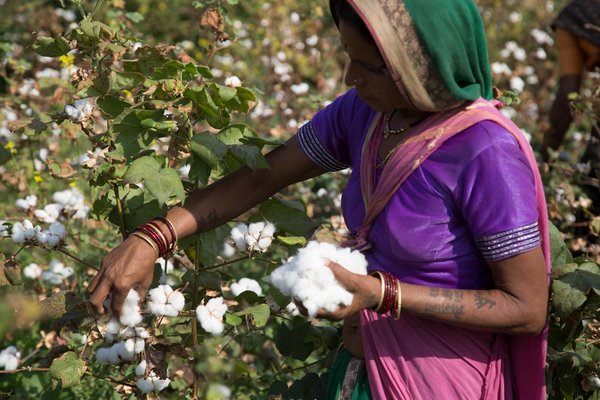Sowing seeds for an organic cotton future

While the consumer appetite for organic cotton continues to grow, farmers face an uphill struggle accessing quality, affordable non-GMO seed for organic cultivation. An agreement signed in Madhya Pradesh, India, between the Organic and Fairtrade Cotton Secretariat (OFCS) and 11 partners across government, the private sector, research institutions and NGOs is now tackling this barrier through a Seed Development Framework and Centre of Excellence.
Alongside Action for Social Advancement (ASA), Solidaridad Network and WWF India, Laudes Foundation is a founding partner of OFCS – a multi-stakeholder initiative with a strategic focus on collaborative partnerships with policymakers – established four years ago to develop a roadmap for organic cotton in Madhya Pradesh. The region is a trailblazer in organic cotton, producing a quarter of the world’s total supply.
Even so, the sector faces a number of challenges, beginning at seed level. Anita Chester Head of Materials at Laudes Foundation, says: “While working with organic cotton farmers in India, Laudes Foundation and our partners have learned that there is a steady demand for non-GMO seeds. However, there are issues across the seed supply chain, from seed supplier to farmer.”
Laudes Foundation and Organic Cotton Accelerator (OCA) have invested in the breeding of organic cotton cultivars in the region for a number of years, with technical expertise coming from the Research Institute of Organic Agriculture (FiBL), pioneers in organic seed research globally. The recently signed Memorandum of Understanding (MoU), spearheaded by OFCS, will take this work further.
The programme brings together the State Agricultural University, seed suppliers, seed breeders, smallholders and private companies who recognise that quality, reliable and affordable organic seed is fundamental to the future growth and sustainability of the sector.
The Centre of Excellence is already up and running and the signatories are now working together on a Seed Development Framework that outlines an approach for compiling, developing, certifying and commercialising promising lines of non-GMO seed. They will prioritise cotton cultivars that are resilient to factors like climate change, water stress and pest attacks and which can deliver cotton yields that meet market demand.
With support from the Indian government, the MoU will focus initially on the state of Madhya Pradesh but with potential to expand to other regions. It is one of the most significant initiatives since the inception of OFCS and the culmination of years of advocacy work.
Charu Jain, Senior Advocacy Manager in Laudes Foundation’s Materials team, says the programme aligns with the Laudes Foundation vision for markets that value all people and respect nature: “Organic cotton is kinder to the planet and the health of farmers – and with a growing international market it can be a sustainable source of income for communities.
“With 11 committed partners signed up to this MoU, there’s every hope that there will be a variety of organic seeds available for organic cotton farmers in the future. OFCS together with its founding partners and member community, will continue to work with policy makers to advocate for supportive policies that benefit farmers and ecosystems.”
Dr Rao from Gwalior University in Madhya Pradesh is overseeing work at the Centre of Excellence. He describes the seed development work as “a most challenging problem that needs urgent attention from policymakers and systemic thinkers.” “With Laudes Foundation acting as a convener, and support and input from such a broad range of stakeholders, this programme of work holds real promise for the future of organic cotton farming, not just in Madhya Pradesh, but potentially across the country.”
